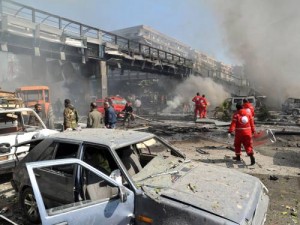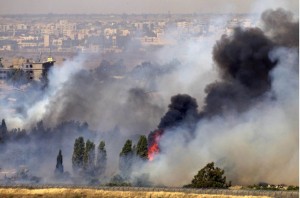The United Nations has launched a record $5.2bn aid appeal to fund operations in Syria and neighbouring nations, saying the number of people affected by the country’s conflict is set to spiral.
The figure presented at an international conference in Geneva on Friday represents a sharp increase from the $3bn the global body had previously estimated it would need this year, of which only $1.4bn has so far been pledged.
“The figure for the new appeal is both an expression of the alarm about the situation facing Syrians and an absence of a political solution,” said Adrian Edwards, spokesman for the UN’s refugee agency.
A total of $3.8bn is needed to help refugees who have spilled across the country’s borders to escape fighting in their homeland, the UN said.
“By the end of the year, half of the population of Syria will be in need of aid,” said Edwards.
Governments of neighbouring countries such as Jordan and Lebanon will receive some of the funds to cope with the influx of refugees, and economic pressures the war has placed on them over the past two years.
The call shines a spotlight on the UN, which has been accused of not doing enough to resolve the conflict so far.
“I do feel that people are unable to understand why the UN and its members of the security council have been unable to find some kind of solution,” Valerie Amos, UN global aid coordinator, told Al Jazeera.
“The credibility for the UN is on the line,” she said. “[But] the UN is made up of 193 member states … crucially we need those 15 countries on the Security Council … to come together and work together to find a solution.”
More than 94,000 people have been killed and some 1.6 million Syrians have fled the country since the civil war began in March 2011 after a crackdown on protests against the government of President Bashar al-Assad.
The number of refugees is expected to reach at least 3.45 million by the end of this year, according to the UN appeal.
Within the country, a total of 6.8 million people are forecast to need aid this year, the majority of them people who have been forced to flee their homes because of the fighting.
Syria’s pre-war population was 20.8 million.
Golan Heights emergency
Meanwhile, UN Security Council is expected to hold an emergency session on Friday to discuss the future of the peacekeeping force in the Israeli-occupied Golan Heights after Austria announced it would withdraw its troops.
The Austrian government decided to withdraw all 380 of its UN peacekeepers from the 900-strong UN mission area on Thursday after two of its soldiers were wounded in fighting between Syrian government forces and rebels near Quneitra border crossing.
The Syrian rebels had taken Quneitra on Thursday but government forces managed to drive them out.
Al Jazeera’s Sue Turton, reporting from the Golan Heights, said the battle between the Syrian army and the rebels appeared to have moved east of Quneitra and that “sporadic shelling could be heard a long way into the distance”.
“This whole conflict has left the Israeli government asking two questions: Will the Syrian government remove its tanks in Quneitra … and who will fill the vacuum that the Austrian troops will leave when they pull out of the UN peacekeeping force?” she said.
President Vladimir Putin proposed on Friday that Russian peacekeepers replace departing Austrian troops “if regional powers express an interest in this.”
The Philippines, meanwhile, has expressed worries and desire to move its troops, our correspondent said.
Al Jazeera’s diplomatic editor James Bays, reporting from Geneva, quoted officials from the peacekeeping department as saying they knew that Austrians were already planning to pull out their troops in part because of a forthcoming election.
He said the search for troops to fill the gap would be difficult because the Austrians have been in the Golan Heights since the beginning of the mission 1974.






